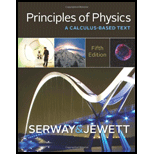
Concept explainers
(a)
The surface charge density on the ground, and whether the surface charge density is positive or negative.
(a)
Answer to Problem 62P
The surface charge density on the ground is
Explanation of Solution
Consider the earth’s surface as a charged
Write the expression for electric field due to charged conducting plane.
Here,
Rearrange equation (I), to find
Conclusion:
Substitute
The electric field inside the conducting earth is zero, the electric field is in downward direction. thus the earth is negatively charged.
Therefore, the surface charge density on the ground is
(b)
The charge of total surface of earth.
(b)
Answer to Problem 62P
The charge of total surface of earth is
Explanation of Solution
Write the expression for charge in terms of surface charge density.
Here,
Due to spherical symmetry of the earth, the surface area is
Apply the condition in the above equation (III), to find
Conclusion:
Substitute
Therefore, the charge of total surface of earth is
(c)
The electric force on the moon exerted by the earth.
(c)
Answer to Problem 62P
The electric force on the moon exerted by the earth is
Explanation of Solution
Given that the charge on the moon is
Write the expression electrostatic force.
Here,
Conclusion:
Substitute
Therefore, the electric force on the moon exerted by the earth is
(d)
Compare the result in subpart (c) with gravitational force on moon due to the earth.
(d)
Answer to Problem 62P
The gravitational force is
Explanation of Solution
From subpart (c), the electric force on the moon exerted by the earth is
Write the expression for gravitational force.
Here,
Conclusion:
Substitute
Divide equation (VII) by (VIII), to find
Rearrange the above equation to find
Therefore, the gravitational force is
Want to see more full solutions like this?
Chapter 19 Solutions
Bundle: Principles of Physics: A Calculus-Based Text, 5th + WebAssign Printed Access Card for Serway/Jewett's Principles of Physics: A Calculus-Based Text, 5th Edition, Multi-Term
- Is work function of a metals surface related to surface energy and surface tension? What is the need to the work function component in the math of tension of metal surfaces that cannot be provided by existing equations of surface energy and surface tension? What are the key differences in each parameter and variables that allow for a differentiation of each function? What has a more significant meaning work function, surface tension or surface energy? Are there real differences and meaning? Please clarify and if possible provide examples . Does surface tension dependant on thickness of a metal or type of metal surface all having the same thickness? Clearly temperature has a profound change on surface tension what other variables besides temperature are key to surface tension. What if any is there a connection between crystal structure of the element and surface energy and tension? This is NOT a Assignment Question!!!arrow_forwardThe cylindrical beam of a 12.7-mW laser is 0.920 cm in diameter. What is the rms value of the electric field? V/marrow_forwardConsider a rubber rod that has been rubbed with fur to give the rod a net negative charge, and a glass rod that has been rubbed with silk to give it a net positive charge. After being charged by contact by the fur and silk...? a. Both rods have less mass b. the rubber rod has more mass and the glass rod has less mass c. both rods have more mass d. the masses of both rods are unchanged e. the rubber rod has less mass and the glass rod has mroe massarrow_forward
 Principles of Physics: A Calculus-Based TextPhysicsISBN:9781133104261Author:Raymond A. Serway, John W. JewettPublisher:Cengage Learning
Principles of Physics: A Calculus-Based TextPhysicsISBN:9781133104261Author:Raymond A. Serway, John W. JewettPublisher:Cengage Learning Physics for Scientists and Engineers: Foundations...PhysicsISBN:9781133939146Author:Katz, Debora M.Publisher:Cengage Learning
Physics for Scientists and Engineers: Foundations...PhysicsISBN:9781133939146Author:Katz, Debora M.Publisher:Cengage Learning College PhysicsPhysicsISBN:9781938168000Author:Paul Peter Urone, Roger HinrichsPublisher:OpenStax College
College PhysicsPhysicsISBN:9781938168000Author:Paul Peter Urone, Roger HinrichsPublisher:OpenStax College College PhysicsPhysicsISBN:9781305952300Author:Raymond A. Serway, Chris VuillePublisher:Cengage Learning
College PhysicsPhysicsISBN:9781305952300Author:Raymond A. Serway, Chris VuillePublisher:Cengage Learning Physics for Scientists and EngineersPhysicsISBN:9781337553278Author:Raymond A. Serway, John W. JewettPublisher:Cengage Learning
Physics for Scientists and EngineersPhysicsISBN:9781337553278Author:Raymond A. Serway, John W. JewettPublisher:Cengage Learning Physics for Scientists and Engineers with Modern ...PhysicsISBN:9781337553292Author:Raymond A. Serway, John W. JewettPublisher:Cengage Learning
Physics for Scientists and Engineers with Modern ...PhysicsISBN:9781337553292Author:Raymond A. Serway, John W. JewettPublisher:Cengage Learning





